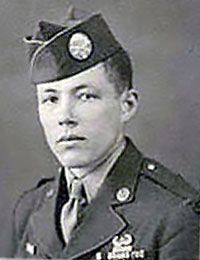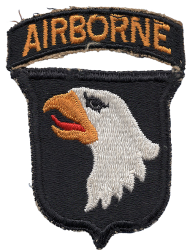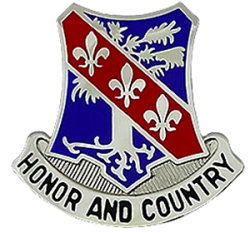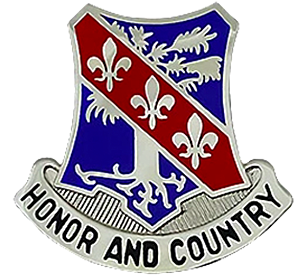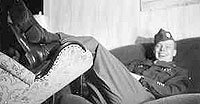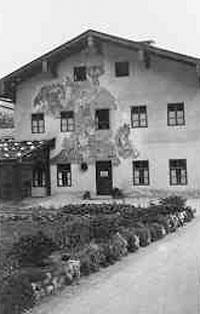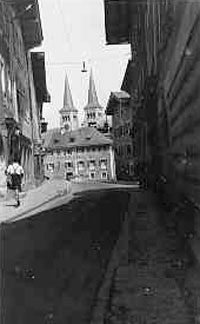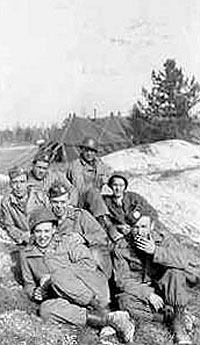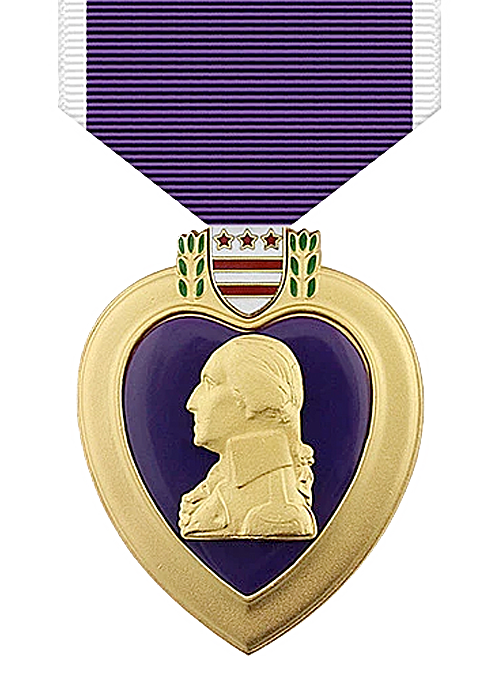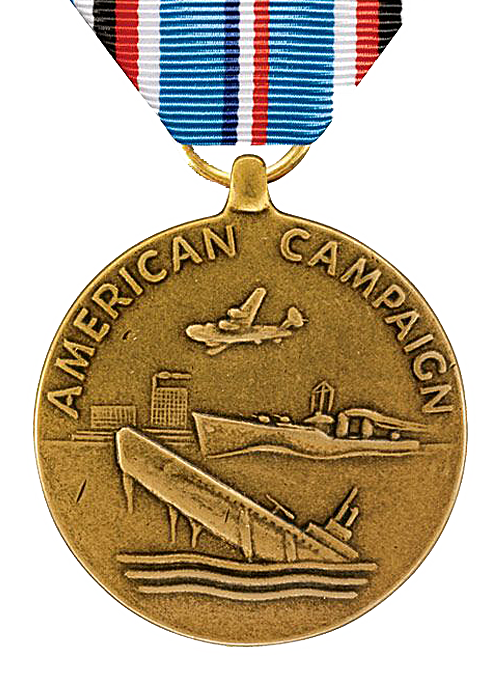It was March 16, 1943 that I marched away as a private into the finest army the world has ever seen. My first stop was Camp Custer, near Battle Creek, Michigan. After being outfitted with the traditional army uniform and introduced to army chow we were sent to Camp Robinson, Arkansas for our basic training. After thirteen weeks of basic we headed for Camp Young, California near Indio. 120 degrees in the shade and no shade. The Colonial who met our train in his welcoming speech opened with the remark, saying that he had never seen a bigger bunch of bastards in all the time he has been in the army. Said we would be gone in thirty days. Sure enough, we were. Thank God.
Luckily I had to suffer through only about thirty days at Camp Young when off we went to Camp Shelby, Mississippi. Other than receiving a 30 day furlough while here, I believe we were sent here for some sort of punishment. It was by far to dirtiest, filthiest camp I was ever in before or after. Hot! and the beds moved all over the barracks when the ants attacted. If you laid a candy bar down on your bunk it was devoured by the ants in minutes. Everyone, was most happy to leave regardless of where we went.
The next stop was Ft Meade, Maryland to get us prepared for overseas. Just the opposite of camp Shelby. We received all our shots, vaccinations and dental work in our short time here. Ft Meade was a real change from Camp Shelby. You have never been in a finer place. The barracks were brick and well maintained. The grass was cut and the shrubs trimmed. Beautiful camp.
After they made sure we were healthy enough to fight Hitler, they sent us to Camp Miles Standish in Massachusetts. This was a staging area to make sure you would know how to salute officers. There were, who knows, hundreds of airforce officers in camp. We had orders to salute each and every one of them. So, I guess in order to get even, instead of walking as a group when an officer approached, we would line up single file saluting each one individually. They in turn would have to return each salute. Needless to say this order was soon dropped.
After a short time at Miles Standish we were sent to Nova Scotia via train and put on the liner Mauritania for a five day cruise to England. On arriving we were all asked if we would like to join the Airborne. Many of us were young and looking for a bit of glory with the paratroops said yes, sure do. So it was off to Reading, England to join the 327th Glider Infantry a regiment of the 101st Airborne Division. Not the paratroops we expected to join. This is where we stayed for the next several months training for the invasion of Europe.
Operation Tiger. Few people have ever heard of it. It was top secret until a few years ago. The 327th unknowingly, was a part of the operation in which there were a couple thousand boats assembled with a few thousand men which they believed were going to take part in a mock invasion of Europe by attacking the shores of England. While off shore from England the Nazi U boats ran into the operation and began torpedoing the ships taking part. There were a few hundred ships sunk with the loss of almost 1,000 lives. Although we were a part of the operation and because it was so large we only heard of what had happened. Because of the seriousness of what had happened the Allies did not want to allow the Germans to know to what extent the damage was caused by the U boats. This was classified as top secret for many years.
Finally the day arrived for the invasion of Europe. June 6th, 1944. Although the 327th was trained for glider landings, there were not enough gliders or C-47 tow planes, I have heard both stories, to transport the 327th to Normandy. So the decision was made to send the 327th in next to the 4th Division to assault Utah Beach in the first wave. This we done with success and fighting our way to join the division at Carentan. Our biggest obstacle was the crossing of the Douve River. In the crossing in rubber boats we were caught in the river by our own artillery loosing many men. After several weeks of heavy combat and loss of men we returned to England for further training.
It was the middle of September that I received a birthday present. My birthday was on September 15th and we were taken to a staging area for Market Garden. The code name for the liberation of Holland.
On September 17 we took off in a very dense fog. You could not see the tow plane. Gliders came down all the way from London, the Channel and many in Western Europe. Not knowing where we were, they cut us loose in Belgium. We landed in a plowed field outside the city of Ghent. Not knowing if we were in German held territory or in Allied territory, we initiated a defensive position around the glider. In the distance we seen a group of people approaching. Not knowing what to expect we stayed down and waited. The first person to approach the glider was a civilian. Did not ask who we were. Did not asked if anyone was hurt. just asked if there was anyone from Detroit. Wanted to know how the Tiger baseball team was doing. What a surprise.
A British unit picked us up and after covering most of Western Belgium, some we found out had not yet been liberated, delivered us to our unit the 327th Glider Infantry Regiment at Eindhoven, Holland. It was as certainly great to see old friendly faces again.
After reaching our unit at Eindhoven we worked our way up Hell's Highway to and through Nijmegen. Nijmegen was pretty well in the hands of the 82nd Airborne so I guess it was decided that we move further north to Doodward and Opheusden, across the river from Arnhem where the British lost an entire division.
In Opheusden we were introduced to our first screaming meemies. This I guess you would say was nothing more than a concussion rocket grenade. The noise when coming in would scare the living HELL out of you. We had one make a direct hit on a occupied fox hole killing both men. Opheusden was bad news. I lost two very good friends there. One got out of his fox hole and stepped on a shoe mine blowing off a leg. His partner in the fox hole jumped out to help him setting off another mine as he stooped down killing him. That is one day I cried.
We left Holland for Mourmelon France and a much needed rest. But before we could get rest we needed and resupplied the Germans decided to attack the area east of Bastogne planing to drive clear to the coast and driving the Allies into the sea. They might have succeeded had they not stopped to capture Bastogne. They had not counted on the 101st Airborne Division fighting as the hole in the doughnut defending it with all they had until George Patton and his armor came to our relief.
I was wounded the day before we were relieved in Bastogne and spent the next thirty days in a hospital in Luxembourg. When I rejoined the division they were resting across the Rhine from Dusseldorf. There we were located in old factories where displaced persons were used for workers. These people were emancipated. Nothing but skin and bones. Wore black and white stripped clothing. Were extremely happy to get anything to eat. To supplement out diet we would fish the Rhine river using hand grenades.
While in Dusseldorf we pulled a six man patrol one night across the Rhine. Before going we were taken by an artillery spotter plane across the Rhine to reconnoiter and decide where we would go that night. After completing out mission and started back, when we were in about the middle of the river, all hell broke loose. The Germans heard us and opened up with their machine guns. Bet you have never seen a rubber boat develop a 50 hp motor and reach the other side in about 30 seconds. It did that night and everyone landed without a scratch.
When we left the Dusseldorf area we headed south going through many bombed out towns and eventually winding up in Berchtesgaden. What a beautiful area. Can easily understand why Hitler chose it for a vacation spot. This is one area I hated to leave. Well, now you know what makes a Glider Rider. It was tough but someone had to do it.
Phil Hooper
